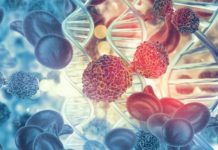Cedars-Sinai researchers have discovered a potential new COVID-19 treatment: a biologic material made from reengineered cell cultures. When tested in human lung cells, scientists discovered that the chemical blocked SARS-CoV-2, the causative agent of COVID-19, from replicating and also protected sick cells. Although the research is still in its early phases, the findings suggest that COVID-19 patients may benefit from a novel treatment. The publication Biomaterials and Biosystems revealed the specifics of the prospective therapy. They were shocked to see that this possible medication inhibits a unique pathway for viral replication while also protecting invading pathogens, said Ahmed G. Ibrahim, PhD, MPH, first author of the study and assistant professor at Cedars-Smidt Sinai’s Heart Institute.
COVID-19 has few treatments now available, and those that do focus entirely on keeping the virus from multiplying. COVID-19 can cause symptoms that affect patients long after the viral infection has been cleared, so this new potential treatment inhibits replication while also protecting or repairing cells, which is essential. Scientists used skin cells termed dermal fibroblasts to develop the potential therapeutic study. The cells were genetically modified to create therapeutic extracellular vesicles (EVs), which are nanoparticles that act as a communication mechanism between cells and tissues. Tuning these fibroblasts enabled them to produce EVs with the ability to heal tissue, which the researchers termed “ASTEX.”
According to the researchers, ASTEX has already been shown to mend heart tissue, lung tissue, and muscle injury in laboratory animals. When the COVID-19 pandemic struck in 2020, researchers began looking into whether ASTEX could be used to cure SARS-CoV-2. The research was carried out in partnership with UCLA researchers, who put ASTEX to the test on human lung epithelial cells that line the lungs and are susceptible to SARS-CoV-2 infection.
ASTEX inhibited cells from initiating an inflammatory response that could result in cell death. SARS-CoV-2 may employ a specific protein called ACE to infect cells, and cells treated using ASTEX created fewer of it.The researchers then compared the prospective treatment to remdesivir, a medication method of treating COVID-19, and discovered that remdesivir had no effect on ACE production. Remdesivir inhibits the virus from hooking on to a specific protein called ACE2. As a result, ASTEX could be another strategy to keep the virus out of cells.
Viruses do not even have their own mechanism for getting into cells, Ibrahim explained. They suspect that one way SARS-CoV-2 infects cells, sabotages their genetic information, and duplicates itself in the body is by targeting ACE proteins.
This hijacking appears to have been halted by ASTEX.This potential anti-COVID-19 biological therapy is unique since it protects infected cells while also inhibiting viral multiplication, said Eduardo Marbán, MD, PhD, ED of the Smidt Heart Institute and Mark S. Siegel Family Foundation Distinguished Professor at Cedars-Sinai. Future study with regards to this is being planned by the researchers.






















